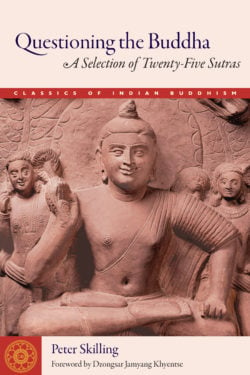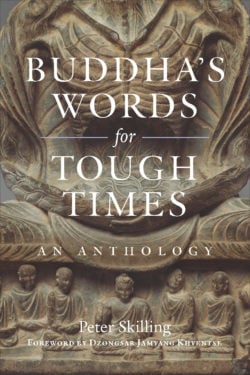Peter Skilling

Peter Skilling is a special lecturer at Chulalongkorn University, Bangkok, and an honorary associate, Department of Indian SubContinental Studies, University of Sydney, Australia. Until his retirement in 2017, he was a professor of the French School of Asian Studies (EFEO) based in Bangkok. He was awarded an honorary doctorate in the humanities by Chulalongkorn University in 2020. He is an honorary member of the Siam Society, Bangkok, and in 2017 he was elected an honorary fellow of the Asiatic Society of Mumbai. He has been visiting professor at Harvard University (2000), the University of California at Berkeley (2001), Oxford University (2002), Sydney University (2009), Soka University (2009), and Savitribai Phule Pune University (2016–17). He has published widely on the Buddhist literature, history, and epigraphy of South and Southeast Asia.
Books, Courses & Podcasts
Questioning the Buddha
In the forty-five years the Buddha spent traversing northern India, he shared his wisdom with everyone from beggar women to kings. Hundreds of his discourses, or sutras, were preserved by his followers, first orally and later in written form. Around thirteen hundred years after the Buddha’s enlightenment, the sutras were translated into the Tibetan language, where they have been preserved ever since. To date, only a fraction of these have been made available in English. Questioning the Buddha brings the reader directly into the literary treasure of the Tibetan canon with thoroughly annotated translations of twenty-five different sutras. Often these texts, many translated here in full for the first time, begin with an encounter in which someone poses a question to the Buddha.
Peter Skilling, an authority on early Buddhist epigraphy, archaeology, and textual traditions, has been immersed in the Buddhist scriptures of diverse traditions for nearly half a century. In this volume, he draws on his deep and extensive research to render these ancient teachings in a fresh and precise language. His introduction is a fascinating history of the Buddhist sutras, including the transition from oral to written form, the rise of Mahayana literature, the transmission to Tibet, the development of canons, and a look at some of the pioneers of sutra study in the West.
Sutras included in this volume are: Four Dharmas Not to Be Taken for Granted; The Benefits of Giving; The Exposition of Four Dharmas; The Merit of the Three Refuges; Four Dharmas Never to Be Abandoned; Advice for Bodhisatva Dharmaketu; Advice for Bodhisatva Jayamati; Sūtra Comparing Bodhicitta to Gold; Bodhisatva Maitreya’s Question about the Gift of the Dharma; Four Summaries of the Dharma Spoken to the Nāga King Sāgara; The Stanza of Dependent Arising; The Heart Formula of Dependent Arising; Prediction of the Boy Brahmaśrī’s Future Buddhahood; Kṣemavatī’s Prediction to Future Buddhahood; The City Beggar Woman; An Old Woman’s Questions about Birth and Death; The Questions of Śrīmatī the Brahman Woman; The Questions of the Laywoman Gaṅgottarā; Brahmā Sahāṃpati’s Question; Advice to King Prasenajit; Passage to the Next Life; Instructions for King Bimbisāra; Instructions for King Udayana; Buddhas as Rare as a Grain of Golden Sand; and Predictions on the Eve of the Great Final Nirvāṇa.
Learn more about the Classics of Indian Buddhism series.
Buddha’s Words for Tough Times
Twenty translations from the vast corpus of Buddhist literature come alive in this full-color anthology of ancient wisdom for turbulent times, as a master scholar uncovers their sources and significance.
Change and loss have always been part of the human condition, but in today’s world, the pace and intensity of uncertainty has reached new extremes. The Buddha observed the truth of impermanence more than 2,500 years ago and diagnosed the source of the anxiety it engenders so incisively that his prescription still resonates and heals here and now.
In Buddha’s Words for Tough Times, Peter Skilling, one of the world’s foremost authorities on Buddhist scripture, brings the reader face to face with the wealth of Buddhist literature, from a teaching in a single word, to a seminal collection of verses on impermanence, to narrations of the Buddha’s teaching journeys across the Gangetic Plain. Translating from sources in Tibetan, Sanskrit, and Pāli, he uncovers the complex history of the vast writings of the Buddhist canons, and his skill in revealing the meaning of twenty gems from within those riches brings them alive for English readers. We could have no better guide for this exploration, an exploration whose value is more urgent than ever.


